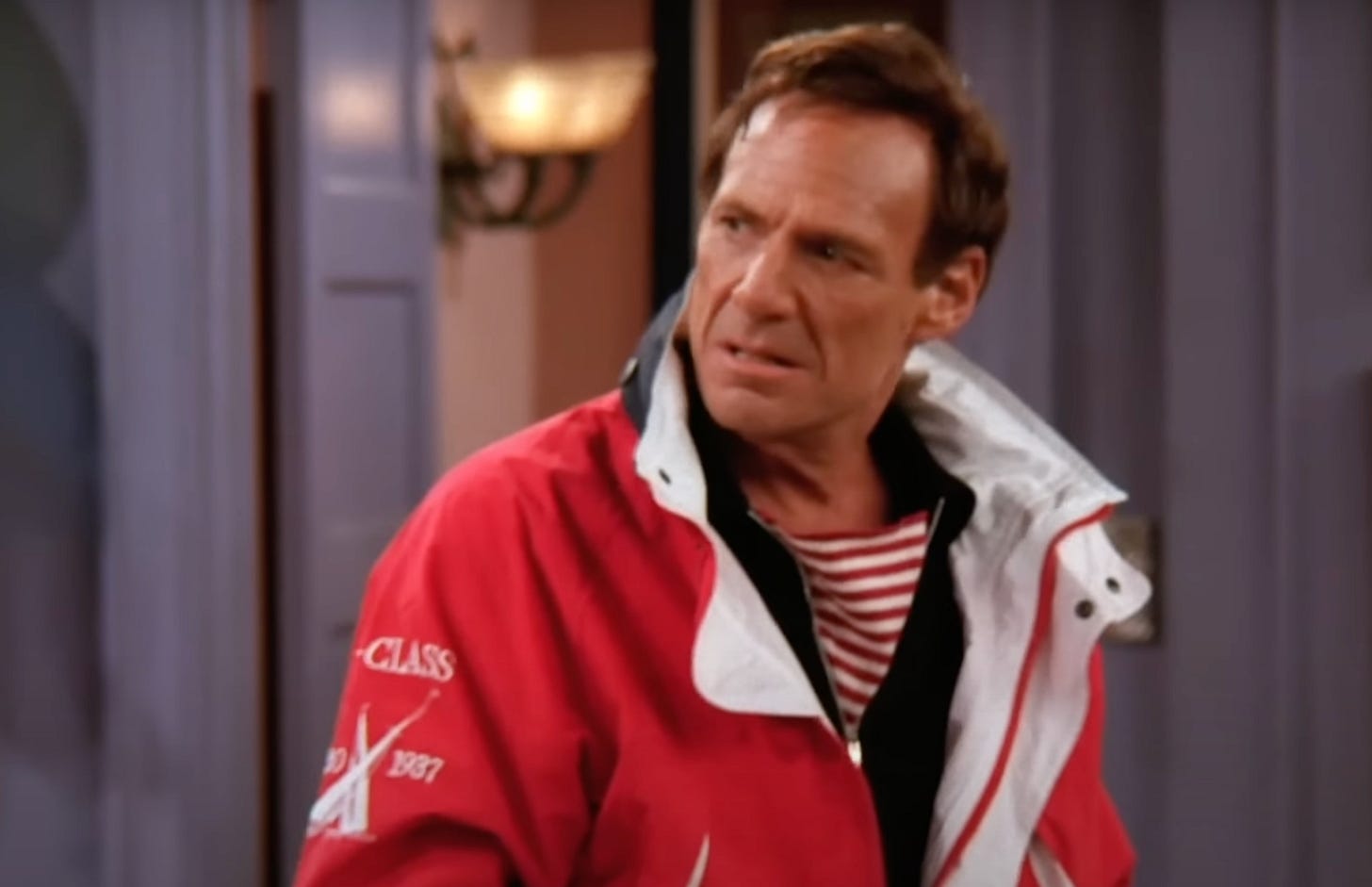Who gets to be Mr Big Shot?
The most misunderstood scene in Friends
You may have heard that Ross — the slightly goofy, geeky but ultimately loveable twenty-something played by David Schwimmer — is "the worst”. This sort of analysis hit a cultural apotheosis in the mid to late 2010s, as Friends itself was enjoying something of a resurgence, after Netflix acquired the streaming rights in 2015.
Some younger millennials, who had missed the show the first time around and were viewing it through a contemporary lens, started to ask: is Friends problematic? And in particular, television’s most reviled palaeontologist? To be fair, Ross does variously:
Lie about getting his marriage annulled
Date a teenage student
Freak out when his son wants to play with a doll
And — spoiler alert — convince Rachel in the show’s finale not to move to Paris to fulfil her professional dreams
And yet, consider the context: Ross’s wife leaves him for another woman. His best (and as far as we know, only) mates continually mock and belittle his work. While his parents, by showering him with praise as a child, failed to prepare him adequately for the realities of adulthood. Then again, I find King Lear to be among the most sympathetic characters in all of Shakespeare. Little wonder I always considered Ross to be more sinned against than sinner.
The scene
In case you lack instant recall or have a real job that precludes you from watching YouTube at your desk, let me briefly set it out. Ross, Rachel and her father, Dr Green (played by a delightfully menacing Ron Leibman) go out for a meal at a swanky-looking restaurant, with the aim of encouraging the two men to bond. Dinner is tense, but not disastrous. That is, until the very end.
Dr Green (in the midst of a difficult divorce from Rachel’s mother) pays the bill but, as he gets up to leave1, Ross notices he only tipped around 4%. This is particularly troubling because Rachel is a waitress. As they depart, Ross takes a $20 note and, when Dr Green is not looking, slips it under the bill. All’s well that ends well.
Of course, not. This is television. When Dr Green realises he forgot the receipt and motions to return to the table, a visibly panicked Ross tries to stop him. Inevitably, the additional twenty is uncovered:
Dr. Green: Excuse me, you think I’m cheap?
Rachel: Oh Daddy, no he didn’t mean anything by that, he really didn’t.
Ross: Nothing I do means anything, really.
Dr. Green: This is nice. I pay two hundred dollars2 for dinner, you put down twenty, and you come out looking like Mr Big Shot. You really want to be Mr Big Shot? Here, I’ll tell you what, you pay the whole bill, Mr Big Shot, all right.
Comedy of manners
When I would have first watched this episode, as a preadolescent in the late 1990s, I’m fairly certain I understood what the show was asking of me. I was supposed to be on Ross’s side. Dr Green was rich, mean and scary. Ross, meanwhile, was only trying to do right by his girlfriend and in support of underpaid hospitality workers who rely on tips to supplement their often meagre incomes.
But the older I got, the murkier the morality tale seemed to grow. Sure, Ross did not set out to embarrass or shame Dr Green, but there is something potent in that line, about putting down a twenty and being the hero, while the guy who paid $200 somehow ends up the cheapskate.
And yeah, Ross could have handled things differently. He could have thanked Dr Green for a lovely dinner and offered to cover the tip as a token of his gratitude. Or even excused himself to the bathroom and offer cash to the wait staff. But I’m not looking to mine for plot holes in a 22-minute network sitcom.
The viewer is being asked to hold space for both men: hurt, flawed and trying in their own ways. Perhaps that is the challenge we all face — to resist the pull of selective empathy and withhold judgment long enough to see more than mere heroes and villains. Not least when all Rachel wants is something heartbreakingly simple: for her father and her boyfriend to be civil, just for a moment, while she makes sense of a world falling apart.
He wants to say good night to the Levines, a detail I for some reason simply adore
For you inflation hawks, that’s $411 in today’s money




I was far too old to watch Friends when it was on TV in Britain but when I was on a holiday in Corfu it was on a continuous look at most of the roadside bars. You mention Rachel is a waitress yet her father is a doctor. Waiting is by far one of the worst paid jobs in Western society so why is a well educated girl doing such a job? The writers must have been sociologists.